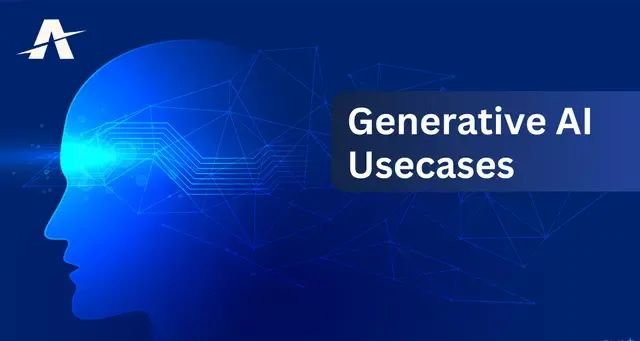
Generative AI services are rapidly transforming the financial industry, enabling institutions to stay ahead in a highly competitive landscape. From automating complex processes to providing personalized customer experiences, this technology is opening up new avenues for growth and innovation. In this blog, we'll explore the key use cases, benefits, and market trends that underscore the importance of generative AI in financial services .
Key Use Cases of Generative AI in the Financial Industry
Fraud Detection and Prevention
The global financial industry faces billions of dollars in losses due to fraud every year. According to a report by Juniper Research, online payment fraud losses are expected to exceed $343 billion globally between 2023 and 2027. Generative AI in financial services plays a pivotal role in combating this issue by analyzing vast datasets and detecting fraudulent activities in real-time. By continuously learning and adapting, AI systems can identify even the most sophisticated fraud attempts, helping financial institutions save significant amounts of money and protect their customers.
Navigate the Future with Generative AI: A Step-by-Step Guide for Business Implementation
Market research indicates that financial institutions are increasingly investing in AI technology. According to a PwC report, AI could contribute up to $1.2 trillion in additional value to the global financial services sector by 2030. To successfully implement generative AI business applications, businesses need to develop a clear strategy that aligns with their long-term goals. This includes selecting the right AI tools, training staff, and integrating AI into existing workflows. As the demand for AI solutions grows, financial institutions that adopt AI early are likely to gain a competitive edge.
Enhanced Customer Support and Services
24/7 Availability
In a world where customer expectations are higher than ever, 24/7 availability is no longer a luxury—it's a necessity. Research by Salesforce shows that 64% of customers expect real-time responses from companies. Generative AI services enable financial institutions to meet these expectations by providing continuous support, ensuring that customers can access services whenever they need them.
Instant Responses
A McKinsey report revealed that companies using AI for customer service can improve response times by up to 60%. This instant response capability is crucial in the financial industry, where customers often need immediate assistance. By providing instant answers to common queries, AI-driven systems enhance customer satisfaction and reduce the burden on human agents.
Seamless Escalation
AI systems that can seamlessly escalate complex issues to human agents are becoming increasingly popular in the financial sector. According to Gartner, by 2025, customer service organizations that embed AI in their multichannel strategy will elevate their operational efficiency by 25%. This capability allows financial institutions to provide a balanced approach to customer service, combining the efficiency of AI with the empathy of human support.
Personalized Financial Advice and Solutions
Custom Investment Strategies
The demand for personalized financial services is growing rapidly. According to Deloitte, 80% of wealth management clients expect personalized services from their advisors. Generative AI in financial services enables institutions to meet this demand by creating custom investment strategies tailored to each client’s unique needs and preferences.
Proactive Financial Guidance
The global market for robo-advisors, which utilize AI to provide financial advice, is projected to reach $41.07 billion by 2027, growing at a CAGR of 37.1% from 2020 to 2027 (Allied Market Research). Generative AI allows financial institutions to offer proactive guidance, helping clients make informed decisions and optimize their financial portfolios.
Enhanced Client Engagement
Client engagement is key to customer retention, and AI-driven insights are making it easier for financial advisors to connect with clients on a deeper level. According to a report by Accenture, 67% of wealth management clients prefer working with financial institutions that use AI to enhance the customer experience. This indicates a strong market trend toward AI-powered personalized services.
Real-Time Portfolio Adjustments
The ability to make real-time adjustments to investment portfolios is becoming increasingly important in volatile markets. According to BlackRock, portfolio optimization through AI can help reduce risk and improve returns. Generative AI services can analyze market conditions and make adjustments on the fly, ensuring that clients' investments are always aligned with their goals.
Tailored Investment Strategies
The global investment management industry is rapidly embracing AI. A survey by Refinitiv found that 56% of investment professionals are already using AI to generate investment ideas. Generative AI development companies take this a step further by tailoring strategies to individual clients, enabling more personalized and effective financial planning.
Generative AI's impact isn’t limited to finance. In the legal sector, AI is automating processes like contract drafting, leading to significant cost savings and efficiency improvements. Learn more about how AI is reshaping the legal industry.
Benefits of Generative AI in Finance
Round-the-Clock Support
In today’s fast-paced world, customers expect 24/7 access to financial services. A survey by PwC found that 74% of financial services executives believe that AI will significantly enhance customer satisfaction. By providing continuous support, generative AI services ensure that customers are never left waiting, leading to higher satisfaction and retention rates.
Seamless Escalation
AI's ability to handle routine tasks and escalate complex issues has proven to be a game-changer. According to a study by Forrester, AI can reduce operational costs by up to 30% by streamlining customer service processes. This efficiency boost allows financial institutions to allocate resources more effectively.
Improved Operational Efficiency
The global market for AI in the financial services sector is expected to reach $22.6 billion by 2025, according to Mordor Intelligence. Generative AI services improve operational efficiency by automating repetitive tasks, allowing financial institutions to focus on more strategic initiatives. This not only reduces costs but also enhances the overall quality of service.
Successfully implementing AI in your organization requires careful planning. From selecting the right platform to ensuring staff are adequately trained, these tips will help you integrate AI smoothly and maximize its potential.
Predictive Customer Insights
Predictive analytics is becoming a cornerstone of modern finance. According to a report by MarketsandMarkets, the predictive analytics market in finance is projected to grow from $7.3 billion in 2020 to $20.5 billion by 2025. Generative AI business applications analyze customer data and generate predictive insights, allowing financial institutions to anticipate customer needs and tailor their services accordingly.
Leverage Generative AI for Improved Customer Satisfaction
Generative AI is not just a technological innovation; it's a strategic asset that can drive significant improvements in customer satisfaction, operational efficiency, and financial performance. As market trends indicate, the adoption of AI in finance is accelerating, and those who leverage this technology effectively will be well-positioned to lead the industry.
By understanding the potential of generative AI and staying informed about market trends, financial institutions can ensure they are at the forefront of innovation, providing better services and achieving greater success.










